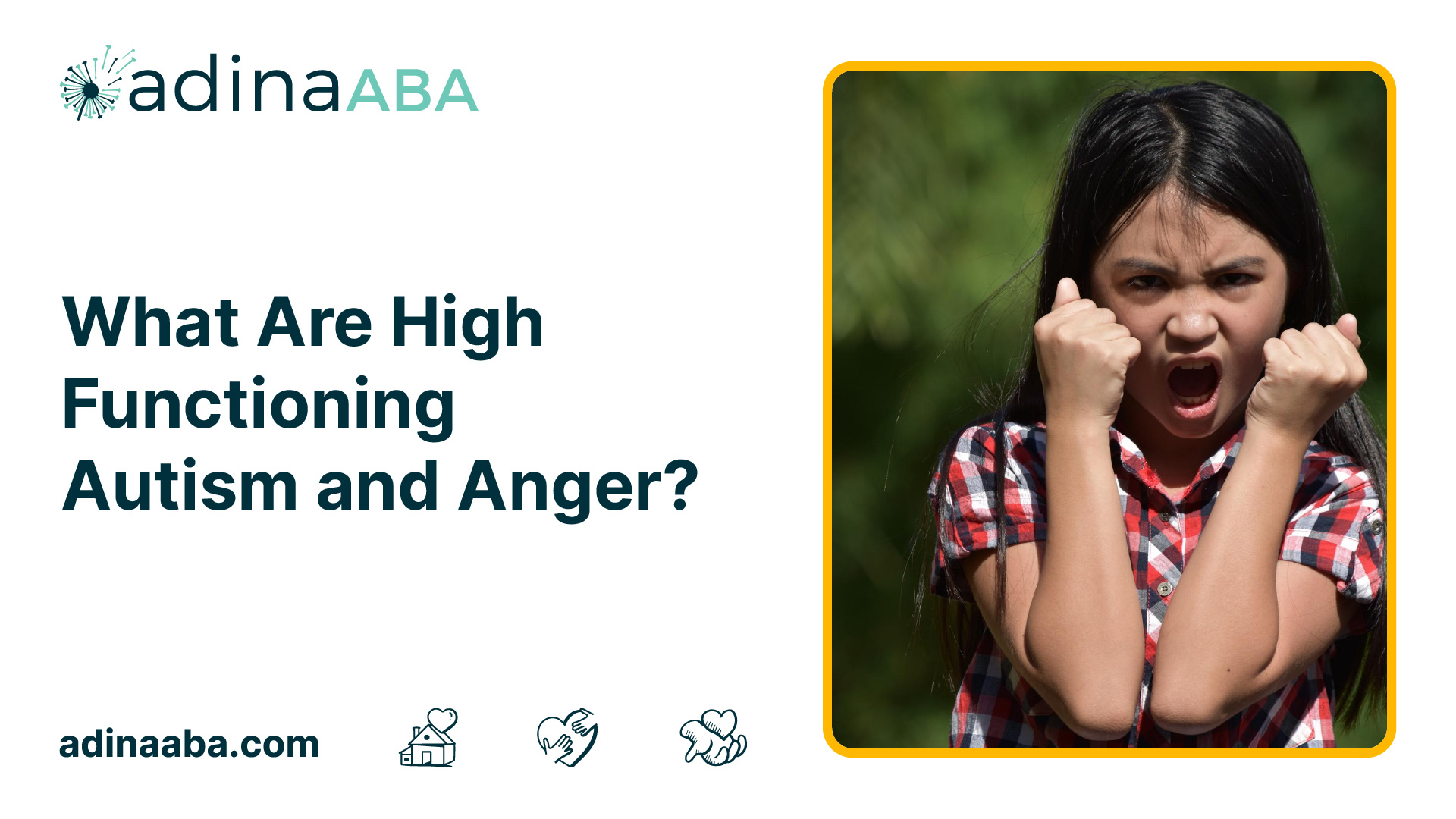What Are High Functioning Autism and Anger?
.jpg)

Understanding High Functioning Autism and Anger
In order to comprehend the relationship between high functioning autism and anger, it is important to first understand what high functioning autism is and how it can manifest in anger.
What is High Functioning Autism?
High functioning autism (HFA), also known as Autism Spectrum Disorder (ASD) Level 1, is a developmental disorder that affects communication, social interaction, and behavior. Individuals with HFA often have average or above-average intelligence and exhibit fewer challenges in daily functioning compared to those with other forms of autism.
Exploring Anger in High Functioning Autism
Anger is a common emotion experienced by individuals with high functioning autism. However, it is crucial to note that not all individuals with HFA experience anger in the same way or to the same degree. The expression and intensity of anger can vary significantly among individuals with HFA.
The Connection Between High Functioning Autism and Anger
The relationship between high functioning autism and anger can be attributed to a variety of factors. One possible cause is the presence of sensory overload and sensory processing differences. Individuals with HFA may have heightened sensitivity to certain sensory stimuli, such as loud noises or bright lights, which can lead to frustration and anger.
Difficulties with emotional regulation also play a role in the manifestation of anger in high functioning autism. The challenges individuals with HFA face in understanding and managing their emotions can contribute to feelings of frustration and difficulty in controlling their anger responses.
Furthermore, social interactions and communication can be challenging for individuals with HFA, leading to feelings of isolation and misunderstanding. The struggle to navigate social situations and effectively communicate their needs and emotions can contribute to increased anger and frustration.
Understanding the connection between high functioning autism and anger is essential in order to provide appropriate support and strategies for managing anger in individuals with HFA. By addressing the underlying factors that contribute to anger, it becomes possible to develop effective coping mechanisms and provide the necessary support for individuals with high functioning autism to lead fulfilling lives.
The Manifestation of Anger in High Functioning Autism
Individuals with high functioning autism may experience anger in unique ways. Understanding the triggers for anger and the common behavioral responses can provide insights into managing and supporting individuals with high functioning autism.
Triggers for Anger
Anger in individuals with high functioning autism can be triggered by various factors. These triggers may vary from person to person, but some common ones include:
Identifying these triggers can help anticipate and prevent situations that may lead to anger outbursts. By proactively addressing these triggers, it is possible to create a more supportive and calming environment for individuals with high functioning autism.
Common Behavioral Responses to Anger
When experiencing anger, individuals with high functioning autism may exhibit a range of behavioral responses. These responses can vary depending on the individual's coping mechanisms and the severity of the anger. Some common behavioral responses include:
It is important to note that these behaviors are not inherently negative or intentional. They are often a response to overwhelming emotions and difficulties in processing and expressing anger appropriately. Recognizing and understanding these behavioral responses can help caregivers, educators, and support professionals provide the necessary support and interventions.
By gaining insights into the triggers for anger and the common behavioral responses exhibited by individuals with high functioning autism, we can develop strategies to effectively manage and support their emotional well-being. This understanding lays the foundation for implementing appropriate interventions and creating a supportive environment that promotes emotional regulation and positive coping mechanisms.
Factors Contributing to Anger in High Functioning Autism
When it comes to understanding anger in individuals with high functioning autism, there are several factors that contribute to its manifestation. These factors include sensory overload and sensory processing differences, difficulties with emotional regulation, and challenges with social interactions and communication.
Sensory Overload and Sensory Processing Differences
One of the primary factors contributing to anger in high functioning autism is sensory overload. Individuals with high functioning autism often have heightened sensitivity to sensory stimuli, such as noise, light, textures, or smells. When exposed to overwhelming sensory input, they may become overwhelmed and experience a sensory overload. This can lead to frustration, irritability, and ultimately, anger.
In addition to sensory overload, individuals with high functioning autism may also have differences in their sensory processing. They may struggle to filter out irrelevant sensory information and may have difficulty integrating sensory input from different sources. These sensory processing differences can contribute to feelings of overwhelm and frustration, which can manifest as anger.
Difficulties with Emotional Regulation
Emotional regulation refers to the ability to manage and control one's emotions in appropriate ways. Individuals with high functioning autism may face challenges in regulating their emotions, including anger. They may have difficulty identifying and labeling their emotions, managing strong emotional reactions, and expressing their feelings in socially acceptable ways.
These difficulties with emotional regulation can lead to heightened anger responses in individuals with high functioning autism. It's important to note that the anger experienced by individuals with high functioning autism is not a result of deliberate or malicious intent, but rather a manifestation of their struggle with emotional regulation.
Challenges with Social Interactions and Communication
Social interactions and communication can be particularly challenging for individuals with high functioning autism. Difficulties in understanding social cues, interpreting nonverbal communication, and engaging in reciprocal conversations can contribute to frustration and anger. Feelings of social isolation and difficulty forming meaningful connections with others can further exacerbate these emotions.
The challenges faced in social interactions and communication can lead to feelings of frustration, anger, and even resentment. It's important to provide support and understanding to individuals with high functioning autism in navigating these social and communication difficulties.
By recognizing and understanding these factors contributing to anger in high functioning autism, we can work towards creating a more inclusive and supportive environment for individuals on the autism spectrum. Implementing strategies to address sensory overload, promoting emotional regulation skills, and fostering positive social interactions can all contribute to better managing anger in individuals with high functioning autism.
Strategies for Managing Anger in High Functioning Autism
Individuals with high functioning autism often face challenges when it comes to managing anger. Fortunately, there are strategies and techniques that can help in effectively managing and coping with anger. Here are three key approaches:
Developing Emotional Regulation Skills
One of the primary strategies for managing anger in high functioning autism is the development of emotional regulation skills. This involves learning to recognize and understand one's emotions, as well as finding appropriate ways to express and manage them.
By developing these skills, individuals with high functioning autism can gain better control over their emotions and prevent anger from escalating.
Building Coping Mechanisms and Self-Calming Techniques
Building coping mechanisms and self-calming techniques is another effective strategy for managing anger in high functioning autism. These techniques provide individuals with tools to calm themselves down and cope with overwhelming emotions.
By incorporating these techniques into their daily lives, individuals with high functioning autism can proactively manage anger and prevent it from escalating into disruptive or harmful behaviors.
Seeking Professional Support and Therapy
In some cases, seeking professional support and therapy can be beneficial for individuals with high functioning autism and anger management issues. Therapists and counselors who specialize in autism spectrum disorders can provide guidance and support in developing effective anger management strategies tailored to the individual's needs.
These interventions can help individuals with high functioning autism understand the underlying causes of their anger, develop coping strategies, and enhance their overall emotional well-being.
By implementing these strategies, individuals with high functioning autism can effectively manage their anger, improve their emotional regulation skills, and lead more fulfilling lives. It is important to remember that each individual is unique, and a personalized approach to anger management is crucial for success.
Support and Understanding for Individuals with High Functioning Autism and Anger
When it comes to individuals with high functioning autism and anger, it is crucial to create a supportive and inclusive environment that promotes acceptance and empathy. Understanding the challenges they face and educating others about high functioning autism and anger are essential steps towards providing the necessary support. Let's explore some strategies to foster support and understanding.
Creating an Inclusive and Supportive Environment
Creating an inclusive and supportive environment is key to helping individuals with high functioning autism navigate their emotions, including anger. Here are some ways to create such an environment:
By implementing these strategies, individuals with high functioning autism will feel supported and valued, which can help reduce anger triggers and enhance emotional well-being.
Educating Others about High Functioning Autism and Anger
Educating others about high functioning autism and anger is crucial for fostering understanding and empathy. By spreading awareness and knowledge, we can reduce stigma and misconceptions. Here are some key points to focus on when educating others:
By promoting education and understanding, we can create a more inclusive society that embraces and supports individuals with high functioning autism and their experiences with anger.
Promoting Acceptance and Empathy
Promoting acceptance and empathy towards individuals with high functioning autism and anger is essential for building a compassionate and supportive community. Here are some ways to promote acceptance and empathy:
By promoting acceptance and empathy, we can create a society that values and supports the unique experiences and challenges faced by individuals with high functioning autism and anger.
Support and understanding are crucial for individuals with high functioning autism to navigate their anger and emotional well-being. By creating inclusive environments, educating others, and promoting acceptance and empathy, we can empower individuals with high functioning autism and help them lead fulfilling lives.
FAQs
Is anger common in people with HFA?
Yes, anger is a common emotion experienced by people with HFA due to various reasons such as sensory overload, communication difficulties, and executive dysfunction.
Are there any specific triggers that can cause anger outbursts in people with HFA?
Yes, people with HFA may have specific triggers that can cause anger outbursts such as loud noises, changes in routine or schedule, social situations, and unexpected events.
Can anger management techniques be helpful for managing anger in people with HFA?
Yes, several strategies like identifying triggers, developing coping mechanisms, practicing relaxation techniques can help manage anger effectively in individuals with HFA. Seeking professional help from a therapist or counselor who specializes in autism can also be beneficial.
How can family members and friends of individuals with HFA support them during an angry outburst?
Family members and friends of individuals with HFA should remain calm during an angry outburst and avoid reacting negatively. They should try to understand the individual's perspective and provide them space to calm down. Afterward, they can discuss the situation calmly and try to find a solution together.
Conclusion
Anger can be a challenging emotion to manage, especially for people with HFA. However, with the right strategies and support, it is possible to manage anger effectively and improve overall well-being. Remember to be patient and kind to yourself or your loved one with HFA. With time and practice, you can learn to manage anger in a healthy and constructive way.
Sources
https://www.goldencaretherapy.com/high-functioning-autism-and-anger
https://www.autismparentingmagazine.com/high-functioning-autism-anger
https://www.thetreetop.com/aba-therapy/autism-and-anger
More Resources
Expert Clinicians
Get started today ->


.jpg)

.jpg)

